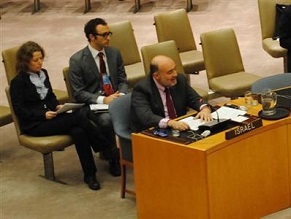|
World Jewish News

Israel's Ambassador to the United Nations, Ron Prosor, addresses the UN Security Council on counter-terrorism.
|
Israeli UN envoy calls for counter-terrorism cooperation as he warns ‘it takes an industry to defeat an industry’
13.05.2013 Israel’s Ambassador to the United Nations Ron Prosor spoke of the Jewish State’s precarious position at the heart of Middle East terrorism as he told a UN Security Council meeting on counterterrorism that terrorism “is a growth industry working around the clock to expand into new markets."
"Its mission is to undermine democracies and its vision is instilling fear through violence,” he added.
Speaking on Friday of Israel’s extensive experience in confronting terrorism at work, invoking recent attacks on Israeli soil from Hamas in Gaza and neighbouring Syria, he stressed the global threat of militancy as a common concern, as he cautioned that “terrorism can strike anywhere at any time”.
Calling for international counter-terrorism cooperation to defeat the growing threat, he concluded that “it takes an industry to defeat an industry”.
Heralding the work of UN agencies in isolating individual terrorist and terrorist entities, he offered Israel’s assistance in confronting the threat by “sharing the knowledge and experience that comes from years of combating terrorism”. Israel’s continued technical cooperation and advanced training to global counter-terrorism experts provide the ongoing collaborating necessary to counter the ever-developing global network of violent extremist groups, he added.
However, the international community did come in for some implied criticism from the Israeli envoy as he warned against council members offering “justification for certain terrorists, while condemning others”, invoking the ongoing dispute between close allies Israel and the US over the international community’s continued reluctance to designate Lebanese militant group Hezbollah a terrorist organisation. Despite designate Gaza rulers Hamas as such, the EU has dragged its feet over responding to Bulgarian authorities’ conclusions that Hezbollah was behind a fatal terrorist attack on Israeli tourists in the Bulgarian town of Burgas last July, contending that the controversial organisation heralds significant political power in Lebanon, aside from its less palatable militant activities.
Emphasising the scale of the threat of global terrorist collusion, Prosor told fellow delegates: “In Gaza, Iran is funding, training and arming Hamas, Islamic Jihad and other terrorists. Iran has helped Hezbollah build its arsenal to unprecedented levels in Lebanon, amassing 50,000 – and I repeat, 50,000 - deadly missiles.” Paraphrasing Hezbollah leader Hassan Nasrallah’s own warning that Syria would supply the group with “game-changing weapons” Thursday, he called for financial sanctions to be enforced on terrorist entities, as he concluded:
“This Council must act today, not tomorrow. We will not allow Hezbollah – and I’d like to emphasize this clearly - to test our resolve. Numerous judicial findings from around the world attest to the magnitude and gravity of Hezbollah's global reach. Yet this still isn't enough for some EU members to call Hezbollah what it is – a terrorist organisation. It operates with impunity on European soil, yet some European lawmakers continue to insist it is a social-services organisation.”
A day previously, fellow delegate, pro-Israel US envoy to the UN Susan E. Rice told the American Jewish Committee (AJC) that Israel’s singling out for criticism at the UN was a cause for concern, as she accepted the committee’s Distinguished Public Service Award at the AJC’s Women’s Leadership Board’s Annual Spring Luncheon in New York.
Condemning “Israel-bashing” as a global problem, she added: “At the UN, Israel endures a barrage of obsessive, unbalanced, and relentless criticism. That undermines the trust between the parties that Secretary of State John Kerry is working so hard to build. It also undermines the UN’s own highest values. The UN should be a place where conflicts are cooled, not inflamed—where confidence is built, not eroded.”
Echoing Prosor’s concerns about the security threat posed to the Jewish State by Hamas and Hezbollah, she issued a rousing call to America’s European allies in insisting that “Israel is justifiably concerned about the risk of Hezbollah obtaining advanced weapons systems”.
Defence concerns were not the only issue at stake for the Jewish State on the international tage, however, as committed to collaborating “closely with our Israeli partners to support Israel in assuming its full and rightful place across the UN system”.
Condemning the Palestinian Authority’s “premature” yet ultimately successful reach for non-member observer status at last November’s Un general Assembly, of which Rice and the US administration were staunch opponents, she emphasised that the Mid East conflict’s “core issues can only be resolved by direct negotiations between the parties—not through diversions at the UN”.
Invoking Kerry’s recent support for the dormant Arab Peace Initiative, of which Israel has to date been a reluctant critic, she described its revival as “a significant step forward”, as she vowed that “the United States will continue to work tirelessly to end this tragic conflict by helping the parties establish, through direct negotiations, two states for two peoples—a secure, Jewish, and democratic state of Israel next to a sovereign, viable Palestinian state”.
Paraphrasing Israel’s first Prime Minister David Ben Gurion’s advocacy of the UN, which he believed could ensure a global “stable and lasting peace, which is possible only if based on justice, equality, and cooperation between nations great and small”, she rounded off her address by saying that his “words still offer a stirring vision for what the UN can be. They still evoke a noble dream of a better planet. Let us remember those hopes—and come together in the holy work of mending our broken world”.
EJP
|
|
